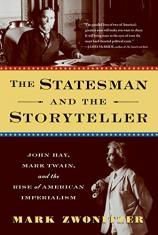The Statesman and the Storyteller: John Hay, Mark Twain, and the Rise of American Imperialism
Review
The Statesman and the Storyteller: John Hay, Mark Twain, and the Rise of American Imperialism
Samuel Clemens, who the world knows as Mark Twain, and John Hay, a man who most Americans do not recognize, had little in common with the exception of their humble beginnings and the environs where they reached maturity.
Both grew up in small towns bordering the Mississippi River. Twain matured on the west bank of the river in Hannibal, Missouri, and Hay on the east banks in west-central Illinois. In 1861, a young Hay would travel to Washington, D.C. to serve as President Abraham Lincoln’s personal secretary. He would later marry, and when his wife inherited a small fortune from her father, he secured the financial independence that allowed him the luxury of continued government service. He skillfully performed in various duties, including Ambassador to England and then Secretary of State to Presidents William McKinley and Theodore Roosevelt. Twain left Hannibal, and after multiple careers as a boatman, journalist, writer and lecturer, he became one of America’s first celebrity authors. He traveled the world and met with heads of state whenever possible. After spending a day with Kaiser Wilhelm and his family, starting with breakfast and followed by a dinner invitation, Twain’s youngest daughter, Jean, remarked, “Papa, the way things are going, pretty soon there won’t be anybody left for you to get acquainted with but God.”
"THE STATESMAN AND THE STORYTELLER is superb history. It provides important information about the major figures of a new and significant era in American foreign policy and portrays America as it hesitatingly emerged as a world power."
Twain and Hay first met in the late 1860s as they corresponded over literary efforts. Twain credited Hay’s PIKE COUNTY BALLADS as an original piece of literature that captured the vernacular of their Mississippi River stomping grounds. The use of such language would be a cornerstone of Twain’s novels. Their contacts and correspondence would continue until the 1890s when Twain and Hay were, for different reasons, important players on the world stage.
THE STATESMAN AND THE STORYTELLER by Mark Zwonitzer is an enjoyable and readable historical saga of America at the crossroads of history. The nation was expanding westward and recovering from the Civil War. She was a burgeoning industrial power and beginning to develop an outward-looking diplomatic and military worldview. Informative history comes not simply from a recounting of events; it goes deeper. Personalities shape history, and history returns the favor by shaping personalities both present and future. Twain and Hay represented two substantially different views of America’s role in the world as the 20th century began. Through their eyes, readers encounter the issues that America would confront as a nation. The country could not deny its rising power in the world. But both the nation and its leaders had to balance that power with a tradition of non-involvement in world politics.
As Secretary of State, Hay was on the inside of American diplomacy in the years that the country ascended to the stage of world leadership. America would go to war with Spain and eventually assert control over Cuba, Puerto Rico and the Philippines. While the publicly stated policy was to gain independence for these countries, dictators by other names assumed power in these new nations. Twain was on the outside, not a part of the government, but his world travels and celebrity status made his observations and public views important in the debate over the new American foreign policy. When Winston Churchill made his first speech in America, Twain agreed to introduce him. His words were stinging: “I think that England sinned when she got herself in a war in South Africa which she could have avoided, just as we have sinned in getting into a similar war in the Philippines.”
Despite their political differences, the two men maintained their friendship. Twain was comforted by the condolences Hay extended to his family at the time of his wife’s death in 1904. Their personal relationship was private, but still allowed them to express political disagreement without damaging their mutual respect.
THE STATESMAN AND THE STORYTELLER is superb history. It provides important information about the major figures of a new and significant era in American foreign policy and portrays America as it hesitatingly emerged as a world power. Even today as our country struggles with our role on the world stage, it is important that we are reminded of two critical concepts: America’s role in the world is ever-changing, and the debate over that role between conflicted patriots can and should be civil and thoughtful.
Reviewed by Stuart Shiffman on April 29, 2016
The Statesman and the Storyteller: John Hay, Mark Twain, and the Rise of American Imperialism
- Publication Date: April 26, 2016
- Genres: Biography, History, Nonfiction
- Hardcover: 704 pages
- Publisher: Algonquin Books
- ISBN-10: 156512989X
- ISBN-13: 9781565129894




